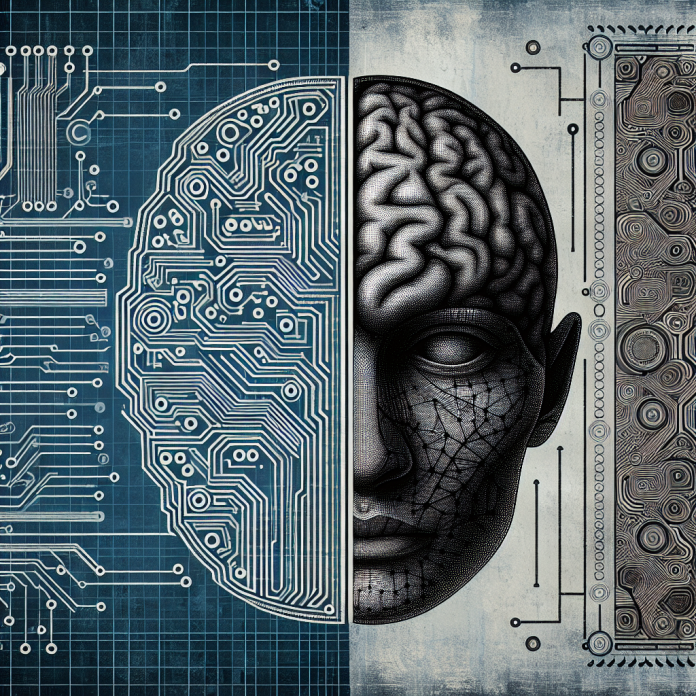## AI vs. Human Intelligence: A Comparison##
Artificial Intelligence (AI) has become a buzzword in recent years, captivating the imagination of the general public as well as scientists and researchers. But how does AI stack up against human intelligence? Is it a threat to our existence or a boon to our progress? In this article, we will delve into the differences between AI and human intelligence, looking at their strengths, weaknesses, and potential implications for society.
### The Basics of AI ###
First, let’s set the stage by defining what AI actually is. AI refers to the simulation of human intelligence processes by machines, especially computer systems. These processes include learning, reasoning, problem-solving, perception, and even creativity. AI systems can perform tasks that typically require human intelligence, such as visual perception, speech recognition, decision-making, and language translation.
### Strengths of AI ###
One of the biggest strengths of AI is its ability to process vast amounts of data quickly and accurately. AI algorithms can analyze data at a speed and scale that far surpasses human capabilities. For example, AI-powered algorithms are used in financial trading to make split-second decisions about buying and selling stocks based on real-time market data.
Another strength of AI is its consistency and reliability. AI systems do not get tired, bored, or distracted like humans do. They can perform repetitive tasks with the same level of accuracy over and over again without experiencing any decline in performance. This makes AI ideal for tasks that require precision and consistency, such as quality control in manufacturing.
### Weaknesses of AI ###
However, AI also has its limitations. One of the biggest weaknesses of AI is its lack of true understanding and common sense. While AI systems can process data and make decisions based on patterns and rules, they do not possess the depth of understanding and intuition that humans have. For example, an AI system may accurately predict stock prices based on historical data, but it cannot anticipate a sudden market crash caused by unforeseen events.
Another weakness of AI is its inability to think creatively and adapt to new situations. AI systems are designed to follow predefined rules and algorithms, which limits their ability to think outside the box or come up with innovative solutions to complex problems. While AI can excel at tasks with well-defined parameters, it struggles with tasks that require improvisation and creativity.
### The Human Advantage ###
Human intelligence, on the other hand, excels in areas where AI falls short. Humans have the ability to think critically, reason abstractly, and make decisions based on intuition and emotional intelligence. Humans can adapt to new situations, learn from experience, and apply knowledge to solve novel problems. This cognitive flexibility and creativity are what set human intelligence apart from AI.
Another advantage of human intelligence is our capacity for empathy and social interaction. Humans can understand and navigate complex social dynamics, interpret nonverbal cues, and build relationships based on trust and rapport. These social skills are essential for collaboration, teamwork, and leadership, areas where AI currently lags behind.
### Implications for Society ###
The rise of AI has sparked debates about its potential impact on society, from job displacement to ethical concerns about AI bias and accountability. While AI has the potential to revolutionize industries, increase efficiency, and improve our quality of life, it also raises questions about the future of work and the role of humans in an increasingly automated world.
As AI continues to advance, it is essential for policymakers, businesses, and society as a whole to consider the ethical and social implications of AI deployment. This includes addressing issues such as AI bias, data privacy, transparency, and accountability to ensure that AI technologies are developed and used responsibly.
### Real-Life Examples ###
To illustrate the differences between AI and human intelligence, let’s consider a real-life example. Imagine a medical diagnosis scenario where an AI system and a human doctor are tasked with diagnosing a patient’s condition based on a set of symptoms.
The AI system, using its vast database of medical knowledge and patient data, can quickly analyze the symptoms and generate a list of potential diagnoses. It can cross-reference the patient’s symptoms with historical cases to identify the most likely condition and recommend treatment options based on best practices.
On the other hand, the human doctor brings years of medical training, experience, and intuition to the table. The doctor can not only look at the symptoms but also consider the patient’s medical history, lifestyle factors, and emotional state. The doctor can ask follow-up questions, conduct physical exams, and use their judgment to make a holistic diagnosis that takes into account the patient’s unique circumstances.
In this scenario, while the AI system excels at processing data and generating accurate diagnoses, it lacks the human touch, empathy, and intuition that the doctor possesses. The doctor’s ability to connect with the patient, build trust, and provide personalized care is something that AI cannot replicate.
### Conclusion ###
In conclusion, the comparison between AI and human intelligence highlights the complementarity of these two forms of intelligence. While AI excels at processing data, performing repetitive tasks, and making quick decisions, human intelligence shines in creativity, critical thinking, empathy, and social skills.
As AI continues to evolve and become more integrated into our lives, it is essential to recognize the unique strengths and limitations of both AI and human intelligence. By leveraging the strengths of both AI and human intelligence, we can harness the power of technology to solve complex problems, improve efficiency, and enhance our quality of life while preserving the human touch and ethical values that define us as a society.

